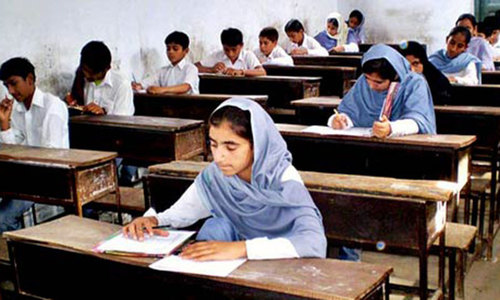ISLAMABAD: The previous federal and provincial governments made tall claims about improving the education sector but official statistics released on Thursday presented a bleak picture showing 22.84 million children still out of school. There was even a slight increase in the number of out of school children compared to the figures released last year.
The figures were highlighted in a report - Pakistan Education Statistics 2016-17 - which was launched by the Academy of Educational Planning and Management (AEPAM), a subsidiary of the federal education ministry, on Thursday.
The annual report launched by caretaker minister for education Mohammad Yusuf Shaikh stated that out of the total 51.53 million children between the age of five and 16, as many as 22.84mn — 44pc — were out of school. According to the 2015-16 report, there were 22.63m out of school children.
Balochistan is home to highest number of out of school children followed by tribal areas
In a relative term, Balochistan is home to the highest proportion of the out of school children followed by Fata. The report said 70pc of children in Balochistan, 57pc in Fata and 52pc in Sindh were out of school.
The percentage for Punjab is 40pc, KP 34pc, AJK and Gilgit-Baltistan 47pc and Islamabad 12pc.
Currently, 5.06m children of primary school age are out of school. At the middle, high and higher secondary level, the number is: 6.51m, 4.97m and 6.29m, respectively.
More girls are out of school than boys. In primary to higher secondary level, 49pc of the population of girls were out of school compared to 40pc of the population of boys.
However, compared to the situation in 2012-13 to 2016-17, the overall number of out of school children saw a decrease of 3.11mn in spite of an increase of 1.22m in their population in the same period. In 2012-13, there were 25.9m out of school children while in 2013-14 the number decreased to 24.81m. In 2014-15, there were 24m and in 2015-16 the figure was 22.63m.
The report said 26pc primary schools were being operated by a single teacher whereas 18pc of the schools had single classroom and 32pc were being run without electricity, 22pc without toilets, 21pc without boundary walls and 22pc without drinking water.
According to the report, seven per cent of the total primary schools in the country were without buildings.
Discussing the survival rate of students to grade five, the report said there was no improvement as the rate was still 67pc which was also reported in 2012-13. In 2015-16, the survival rate was 66pc. The statistics also showed that effective transition rate (ETR) from middle to secondary level had slightly decreased from 92pc to 91pc between 2015-16 and 2016-17.
In a bid to attract the attention of policymakers and parliamentarians, the report also highlighted some positive developments which took place after 2012. It said there was an increase of 5.21pc in enrollment between 2012-123 and 2016-17 in class 1-12 while the gross enrollment rate (GRE) in pre-primary education increased from 74pc to 84pc from 2015-16 to 2017-18. The share of enrollment in the public sector for class 1-12 increased from 63pc to 64pc between 2015-16 and 2016-17.
Girls’ enrolment at the higher secondary level in the public sector increased by 77pc between 2012 and 2017. There was a significant improvement in physical facilities in public schools during the last four years but the official figures showed there was still a lot to be done in this regard.
Speaking at the report launching ceremony, the caretaker education minster appreciated the efforts of AEPAM for compiling the report, which carried authentic data and would be helpful for researchers and policymakers to take steps in the education sector. The minister said education was the most important sector and needed special attention.
Unesco Director for Pakistan Vibeke Jensen and AEPAM Director General Dawood Shah also spoke on the occasion.
Published in Dawn, July 6th, 2018












































